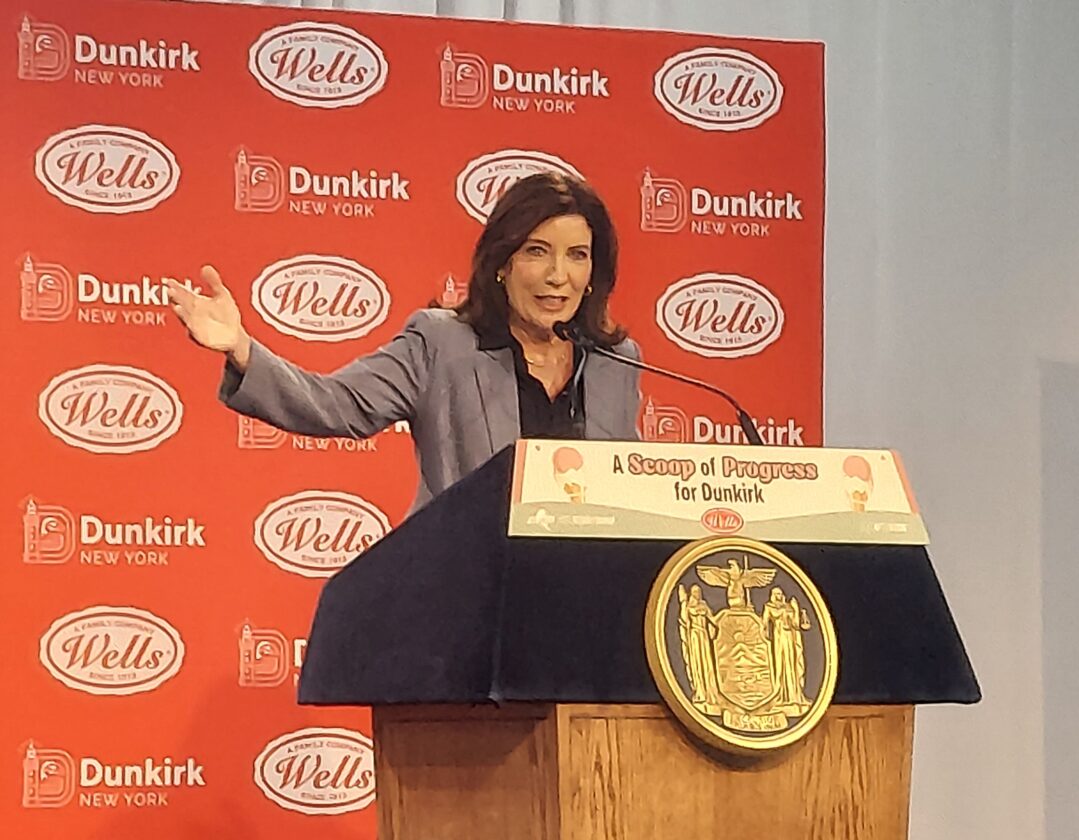Borrello, Molitor want to see 2024 Dunkirk audit

Gov. Kathy Hochul is pictured during a 2024 visit to Dunkirk to speak about Wells Enterprises’ expansion in Dunkirk. P-J file photo
The region’s state lawmakers want Gov. Kathy Hochul to push the city of Dunkirk to submit its 2024 independent audit to the state Comptroller’s Office
Borrello and Molitor said Monday they want immediate action from Hochul and Dunkirk Mayor Kate Wdowiasz to address the city of Dunkirk’s failure to submit its legally required 2024 independent audit to Comptroller Thomas DiNapoli’s office. Despite assurances that the audit would be completed by July 2025, neither the Comptroller’s Office nor legislative offices have received the report. Preliminary financial figures submitted by the city have been deemed insufficient and do not meet statutory requirements, leaving the comptroller unable to certify the city’s deficit.
“This lack of compliance undermines transparency and accountability,” Borrello and Molitor said in a news release Monday. “Especially in light of the $13.7 million high-interest state loan approved earlier this year, without the usual home-rule message from the Dunkirk Common Council, taxpayers deserve clarity and answers.”
In formal letters sent to both Hochul and Wdowiasz, Borrello and Molitor requested:
• A detailed explanation from the governor’s office regarding oversight efforts to ensure compliance with state law.
• A clear timeline from the mayor on the completion and submission of the 2024 audit.
• A reaffirmation of the city’s commitment to quarterly financial reporting, annual audits, and full cooperation with the Comptroller’s oversight, as required under the Dunkirk Fiscal Recovery Act and the newly enacted City of Dunkirk Revenue Anticipation Note Refinancing Act.
The audit is a critical component of the city’s financial recovery plan. Without it, state officials cannot accurately assess Dunkirk’s fiscal condition or its ability to manage and repay the outstanding state loan.
“We remain committed to helping Dunkirk regain its financial stability,” Borrello and Molitor said. “But that support must be grounded in full transparency, complete reporting, and strict accountability to state law.”
Ellen Luczkowiak, Dunkirk fiscal affairs officer, told Dunkirk Common Council members that a much-awaited audit of the city’s 2024 finances is underway. The audit’s completion was originally expected sometime in September – though that’s not what Molitor and Borrello were told to expect.
“Auditors have been here a couple times already and we hope to have that finished ahead of schedule,” Luczkowiak told council members.
Gov. Kathy Hochul signed legislation in late June that authorizes a $13.6 million emergency loan from the state of New York to the city of Dunkirk. In the news release, Hochul’s office said Dunkirk is facing a severe fiscal crisis driven by years of structural deficits and compounded by a looming deadline to repay a major revenue anticipation note. The legislation, the release said, safeguards Dunkirk residents from alternative measures, such as the creation of a financial control board. Legislation S.8413/A.8870 enacts “The City of Dunkirk Revenue Anticipation Note Refinancing Act,” which allows the city to use state funds to repay its $12.7 million revenue anticipation note due July 24, 2025, which it would otherwise be unable to pay in full. The loan carries a 15-year amortization period at a 7.5 percent interest rate and must be repaid using city revenues, including through offsets to state aid.
Molitor and Borrello had both urged Hochul to veto the legislation in favor of legislation they had introduced creating a fiscal control board.
An audit of the city’s finances for 2023 was released in June after being given to the city in April, showed a fund balance that plummeted from $5,847,506 as of Jan. 1, 2019, to a deficit of $6,301,023 on Dec. 31, 2023. The city spent $9,999,623 more than its total revenues in 2019. The excess of expenditures over revenues was about $6.4 million in 2020, $1.6 million in 2021, and around $2.6 million for both 2022 and 2022, according to the 2023 audit by Drescher and Malecki.





